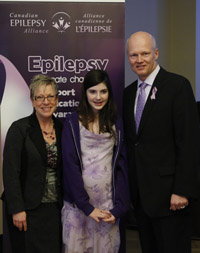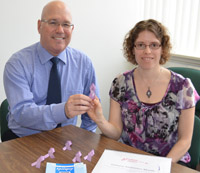Representatives from epilepsy support agencies say they’re encouraged by the reception their advocacy work with government officials received this month, and hope their colleagues provincewide will continue talking with politicians about the epilepsy community’s needs after March 31.
March is Epilepsy Awareness Month, and leaders from within the epilepsy community have been meeting with politicians from all government levels this month to provide information and education about the neurological disorder.

The need to see Ontario’s proposed epilepsy strategy move forward was a major topic during meetings, as were the benefits the epilepsy community will see from the province’s recent five-year, $100-million funding to the Ontario Brain Institute, much of which will be spent on epilepsy research.
As part of the proposed strategy, which was designed by an expert panel, epilepsy care centres with state-of-the-art equipment would be established provincewide and serve as primary access points for people with epilepsy. Through these facilities, patients would have access to epileptologists, psychologists and social workers. The sites would be equipped with the latest in epilepsy monitoring and imaging equipment.
Epilepsy Simcoe County executive director Melanie Money says the greatest success she saw from her advocacy work was bringing local, provincial and federal leaders together at the same time to discuss issues facing the epilepsy community — particularly the need for a provincial strategy and the urgency of legislation to address medication shortages.
The agency recently hosted a luncheon that brought together Barrie MP Patrick Brown, Barrie Mayor Jeff Lehman, Orillia Mayor Angelo Orsi and a representative from Barrie MPP Rod Jackson’s office.
“We were able to educate those politicians to make them aware of the drug shortage, to make them aware of the strategic plan that we have going on — what we came away with was support,” says Money, who has also been working with Brown, a member of the standing health committee, to develop a strategy to address drug-shortage issues.
“We had people who didn’t know what was going on in (the epilepsy community). By being able to educate them, they were able to take away some knowledge, and they could see that this was very important to us, so we are going to help.”
Advocacy was also in full swing at Epilepsy Durham Region. On March 6, agency representatives, along with the parent of a child living with epilepsy, met with the Opposition Progressive Conservatives at Queen’s Park. Plans are underway to meet with the governing Liberals soon.
The need for a provincial epilepsy strategy was a key point of the conversations, and the group’s concerns were met with a positive response, says Epilepsy Durham Region executive director Dianne McKenzie.
The group’s success was apparent when health critic and Whitby-Oshawa MPP Christine Elliott wrote a letter on Epilepsy Durham Region’s behalf to Health and Long-Term Care Minister Deb Matthews underscoring the need for a provincial epilepsy strategy.

Durham MPP John O’Toole sent Epilepsy Durham Region a letter thanking the agency for speaking with the Opposition party members. He emphasized the importance of having the most up-to-date information available to politicians.
“The material you provided about the need for an Ontario epilepsy strategy will be most helpful as health-care priorities for Ontario are considered in the legislature,” he wrote.
Asked about the best long-term result from the conversations with the government and Opposition, McKenzie doesn’t hesitate in her reply.
“(It would be to) have their unanimous support for the proposed Ontario epilepsy strategy, 100 per cent, across the board, all parties. That would be the ultimate goal,” she says.
On March 26, members of the Canadian Epilepsy Alliance gathered on Parliament Hill in Ottawa to celebrate the first anniversary of Purple Day legislation, which was initiated by Halifax West MP Geoff Regan.
“(Parliament) was a sea of purple,” says Epilepsy Ontario executive director Rozalyn Werner-Arcé, who attended the event. “I was so proud and am so appreciative of the support across all parties.”
If you have feedback on this story, or have a story of your own that you would like to share, please contact the newsroom at 800-294-0051, ext. 23, or e-mail deron(at)axiomnews.ca. You can also leave a comment below.
Writer: Deron Hamel
* If you wish to reprint this story, please include following notice: “This story originally appeared on the Epilepsy Ontario website.”





